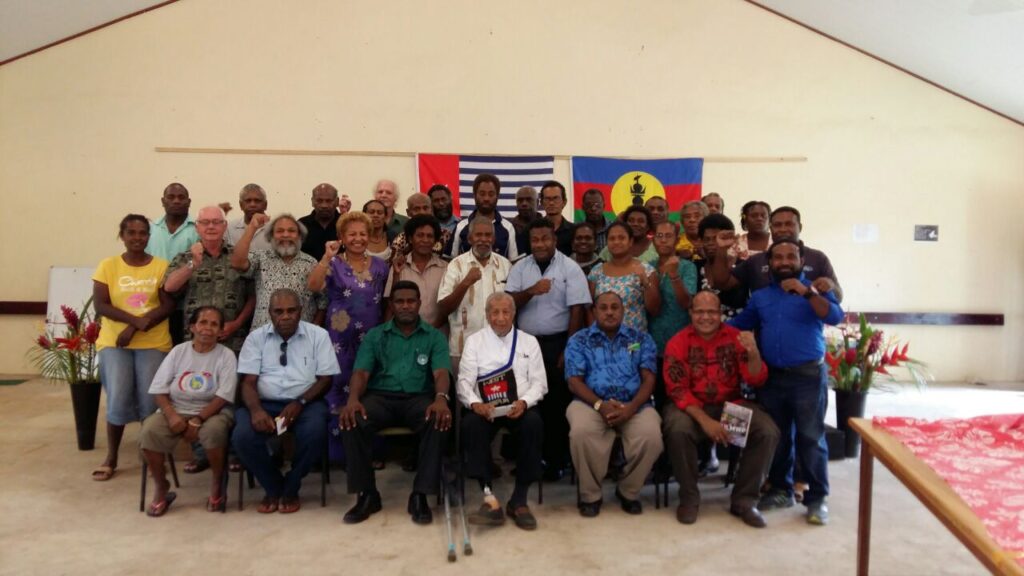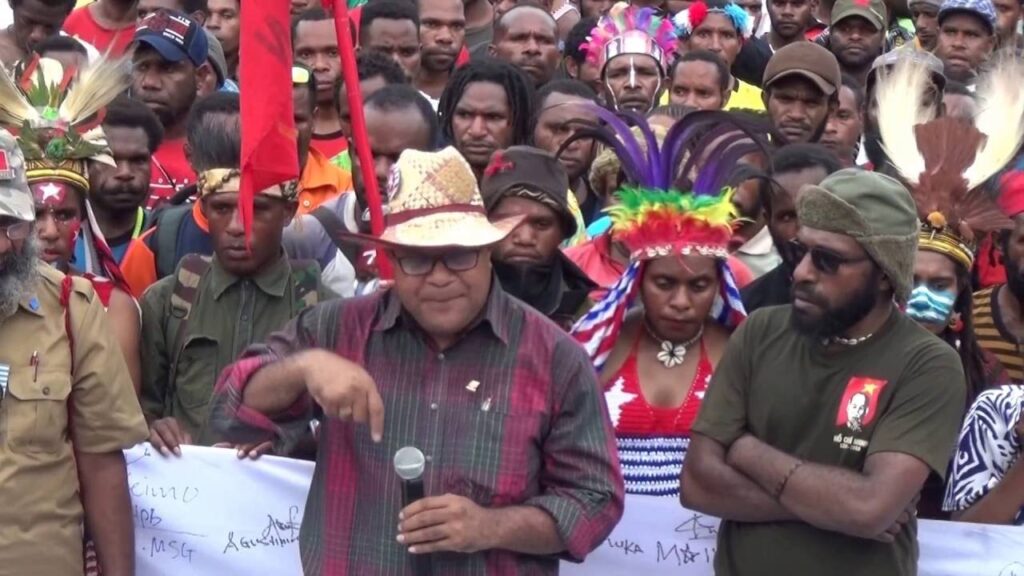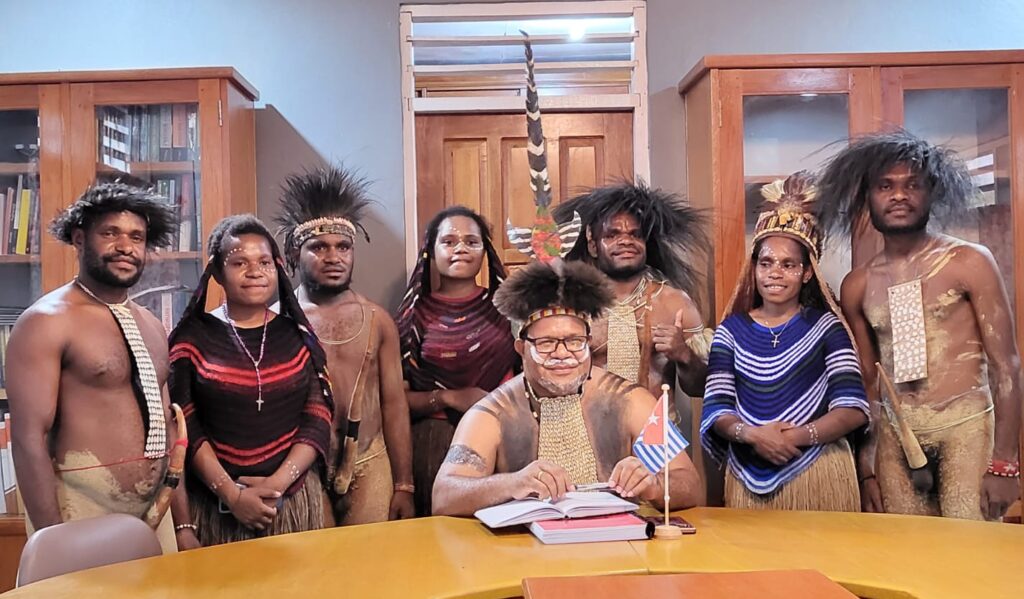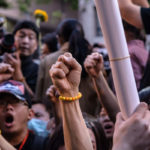Minds of the Movement
An ICNC blog on the people and power of civil resistance
by Indonesian PacifistNovember 13, 2023
This article is part of the REACT (Research-in-Action) series powered by ActionAid Denmark, which features activist writing and explores the power this writing harnesses. Check out the full series here.
I began to explore the problems of West Papua during the COVID pandemic through human rights forums Amnesty International, Tapol.UK, ICNC and other sites. With the extra time I had during COVID lockdowns in 2020 here in France, I launched the bilingual (French/English) blog, Markus Haluk Papua, on the struggle of West Papuans against Indonesian colonization, as a way to engage in activism as a member of the Indonesian diaspora in France.
I have always enjoyed writing. I’m committed to using my residency in France, where freedom of expression is recognized, as an asset to the West Papuan independence struggle. This is a struggle that is invisible in international news and one that few people know about, beyond those directly involved or affected by it. But I have continued my blog activism, because I am committed to raising the visibility of this largely ignored but pressing conflict. As one of very few online platforms about West Papua, my blog has been visited almost 30,000 times and has about 4,000 readers per month.
It is in this context that I recently contacted Markus Haluk, executive director of the United Liberation Movement for West Papua (ULMWP), who is based in Jayapura, Indonesia. He has been arrested many times by the Indonesian police for his activism; however, he has such a high profile now and benefits from the protection of church leaders and international organizations. If he were ever killed by Indonesian police, there would be riots, and the Indonesian government does not want that to happen.

West Papuan independence benefits from some level of external support, especially among Southern Pacific countries, yet it still remains largely overlooked on the international scene. Credit: Markus Haluk.
First, a bit of historical context
Before I relate my conversation with Markus, it may be helpful to have a bit of context about West Papua. It is the western half of New Guinea island in the Pacific. Due to its dense forests and high mountains, West Papua is one of the most isolated areas on the planet. It has been inhabited by Indigenous Melanesian groups for more than 50,000 years.
Claimed by the Dutch as a colony in the 19th century, West Papua declared its independence on December 1, 1961. However, Indonesia annexed the region through a 1969 referendum widely considered a sham. Since then, the daily lives of West Papuans have been colored by violence and murder. Although it is impossible to verify (the Indonesian government allegedly never lets foreign teams conduct research), some sources estimate that 500,000 indigenous West Papuans or more have been killed by Indonesian state forces since the 1960s.
Even though West Papua is only 250 km north of Australia, access for foreign media and NGOs is almost non-existent. Despite its abundance of natural resources, West Papua is a very poor region. Indigenous West Papuans are the main victims of multinational maneuvers: Forests are being cut down to produce palm oil. Biodiversity is endangered due to several mining activities. Today the indigenous West Papuans represent less than 50 percent of West Papua’s total population.

Markus Haluk, executive director of the United Liberation Movement for West Papua, a nonviolent movement for the decolonization of West Papua.
Markus Haluk’s remarks
Markus spoke to me at length about the nonviolent struggle his organization is waging against Indonesian state violence. While some West Papuans lead guerrilla warfare in the mountains, the majority struggle through nonviolent means to obtain their right to self-determination. They regularly organize peaceful protests in cities across and outside West Papua.
For many West Papuans, independence is the only solution to maintain their identity and land. In 2014, the main West Papuan struggle factions merged under the ULMWP umbrella. Recently, ULMWP organized several rallies supporting West Papua's full membership in the Melanesian Spearhead Group (MSG), a south Pacific regional forum. This will make it possible for ULMWP to carry out negotiations with Indonesia at the international level.
Our goals and participants
Markus: The goal of ULMWP's nonviolent struggle is to obtain the right to self-determination: the annexation of West Papua by Indonesia is illegitimate and immoral. Various studies, such as research by Dr. John Salford, Prof. P.J. Drooglever and many researchers have proven that. We need to bring the West Papua issue back to the UN by reviewing resolution 2504 of 1969.
Most of our movement participants are young men, especially students. However, more and more young women and also elderly people are taking part in our actions. These take place in urban centers. In 2019, mass protests against racism took place in 40 cities across and outside West Papua. We also launch petitions. The biggest one got over a million signatures and this was handed over to Madam Michelle Bachelet, the head of the UN human rights commission in Geneva.
Our challenges and strategic considerations
Markus: Internally, we experienced difficulties in coordination, especially between Papuans living in West Papua and the Papuans living abroad [ed: Papuans is short for West Papuans]. Due to different sensibilities, it is often difficult for us to reach consensus. Externally, we are under tremendous pressure and violence from the authorities, especially the Indonesian army and police. Added to this is the blackout campaign of the mass media which is financed by the Indonesian oligarchy.
ULMWP seeks to build its credibility as the legal representative of the West Papuan nation. At the international level we oppose the Indonesian government's efforts to discredit our movement. ULMWP is in the process of becoming a full member of the South Pacific MSG forum. This received tremendous support from the people of Vanuatu, Papua New Guinea and Kanaky (New Caledonia). The latter is struggling to escape French colonialism.
Our inspiration and our tactics
Markus: We are particularly inspired by the struggles of the people of South Africa (ANC), the people of Kanaky (FLNKS) and the people of East Timor (CNRT). It is interesting to note that Free Papua Organization has collaborated with the ANC. Nobel peace laureate Desmond Tutu fully supported West Papuan independence!
At the grassroots level, West Papuans have many expressions to show their opposition to the Indonesian government. Beyond street rallies, many have boycotted Indonesian elections. Some mocked their Indonesian citizenship by making their own West Papuan ID cards. And the most effective is the non-cooperation of indigenous Papuans in carrying out Indonesian development projects that only benefit the oligarchy. They refuse to sell their land to anyone for any reason!
Young Papuans are no longer afraid to publicly defend the independence cause. They wear proudly attributes patterned with the Morning Star, the flag of Free West Papua. As waving the Morning Star flag is often violently repressed, these youths do not hesitate to paint their own bodies with the flag's motif. Our determination to fight for independence through nonviolent means is getting stronger. This is in accordance with what our founding fathers pioneered on December 1, 1961.

More and more young women and also elderly people are taking part in the nonviolent struggle for West Papuan independence. Credit: Markus Haluk.
An inner struggle
Writing for me, Indonesian Pacifist (my pen name), is an inner struggle to maintain a pure human conscience. I chose to focus on West Papua because it concerns humanity and the survival of a nation with 50,000 years of tradition that is now on the verge of extinction. Through the Markus Haluk blog, I hope to avail international readers of difficult-to-access news and information about West Papua based on sources from Indigenous West Papuans themselves.

Indonesian Pacifist
Indonesian Pacifist is a member of the Indonesian diaspora based in France. He started the Markus Haluk blog on West Papua during the first months of the COVID-19 pandemic as a way to grow his advocacy and activism in support of this people’s nonviolent movement against Indonesian colonization.
Read More